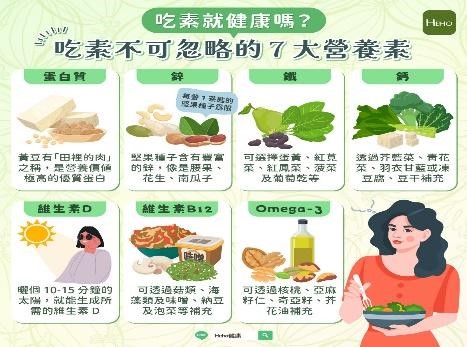Are You a Vegetarian? Increasing Numbers of People Are Becoming Vegetarians Not Only for Religious Reasons but Also to Contribute to the Environment, Manage Their Weight, and Pursue Health. However, Different Types of Vegetarian Diets May Lack Eggs, Dairy, and Meat. How Can One Eat to Achieve Balanced Nutrition? Nutritionists Remind You to Pay Attention to These 7 Essential Nutrients.
https://news.immigration.gov.tw/NewsSection/Detail/BC9D124D-CA4D-4BAC-B64A-CD289124D66E?lang=TW
- Protein In a lacto-ovo vegetarian diet, aside from seafood and meat, eggs and dairy products are available. However, for vegans, protein sources are somewhat limited and can only be obtained from plant-based foods. Plant-based foods are mostly "incomplete proteins," with relatively incomplete essential amino acids and poorer absorption. Supplement Tip: Soybeans, known as "meat from the field," are a high-quality protein with great nutritional value. You can meet your needs through edamame, black beans, or soybean products like soy milk and tofu. Combine with the "complementary effect" of protein by pairing whole grains and legumes in each meal to complement the missing amino acids.

Vegetarians Can Also Be Healthy. (Image provided by Public Domains)
- Zinc Zinc is involved in many metabolic processes, such as promoting growth, maintaining the immune and reproductive systems, and regulating hormones. Zinc primarily comes from lean meats and seafood, and in a vegetarian diet, phytates and oxalates in dietary fiber can interfere with zinc absorption. Supplement Tip: Nuts and seeds are rich in zinc. You can add walnuts, cashews, peanuts, pumpkin seeds, and sesame to your dishes. However, pay attention to the portions, limiting to 1 tablespoon per day or 1 teaspoon per meal to avoid excessive fat intake.

Soybeans, known as "meat from the field," are a high-quality protein with great nutritional value. (Image provided by Flickr)
- Iron It's often heard that vegetarians are prone to anemia because iron deficiency affects red blood cell production, leading to insufficient oxygen supply. The iron in red meat is the best absorbed by the body, although vegetables also contain iron, but in lower amounts and with lower bioavailability. Phytates and oxalates in fiber further decrease absorption. Supplement Tip: Egg yolks contain more iron than egg whites. Vegans can choose iron-rich foods such as red amaranth, spinach, algae, black sesame, and raisins. After meals, have fruits rich in vitamin C, like guava or kiwi, or a glass of orange juice to aid iron absorption.
- Calcium Calcium not only helps with growth but is also key for muscle contraction, heart function, and nerve signaling. Dairy products are rich in calcium, so lacto-vegetarians can get it from milk, yogurt, and cheese. Some plant-based foods have high phytate and oxalate content that bind to calcium, reducing absorption. Supplement Tip: Vegans can choose high-calcium vegetables with better absorption, like kale, broccoli, and bok choy. Soy products like traditional tofu, frozen tofu, and dried tofu are richer in calcium than soft tofu and soy milk because their coagulants (gypsum) are calcium-rich.
- Vitamin D Calcium absorption and balance require the help of vitamin D. We can get vitamin D from fatty fish like sardines and salmon, liver, egg yolks, and fortified dairy products. Lacto-ovo vegetarians can still get vitamin D, but for vegans, there are no good plant sources of vitamin D. Supplement Tip: Luckily, our bodies can synthesize vitamin D. Just by sunbathing, the skin can produce the necessary vitamin D. It's recommended to avoid the intense midday UV rays and choose morning (9-10 am) or afternoon (3-4 pm) for 10-15 minutes of sunlight.
- Vitamin B12 Vitamin B12 is essential for blood formation and the health of the nervous system. Long-term deficiency can cause nerve damage and "pernicious anemia." Vitamin B12 is found in animal products, so lacto-ovo vegetarians need not worry, but vegans should be cautious! Supplement Tip: Mushrooms, algae (like nori and kelp), and fermented foods like miso, natto, and kimchi are rare plant sources of vitamin B12. However, we cannot guarantee all the vitamin B12 in them is active, so vegans should use nutritional supplements or B12-fortified foods.
- Omega-3 Fatty Acids Omega-3 plays a crucial role in regulating the immune system. EPA prevents cardiovascular diseases and has anti-inflammatory properties, while DHA helps with brain clarity and eye health. The best sources are fatty fish and fish oil, which vegetarians cannot consume. Supplement Tip: Plant-based sources of Omega-3 are alpha-linolenic acid (ALA), which can be converted to EPA and DHA. You can get ALA from walnuts, flaxseeds, chia seeds, and canola oil. Although the conversion rate of ALA to EPA and DHA is low, sufficient dietary ALA intake is still important for meeting the body's Omega-3 needs. Vegetarians can also use algae oil to increase DHA levels.







